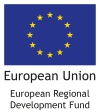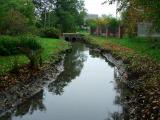P2 Sustainable use of common resources
2.4. Reduced nutrients, hazardous substances and toxins inflow into the Baltic Sea
Central Baltic
01.03.2018 - 28.02.2021
€1 898 349
€1 488 789
Local authorities located on the Baltic Sea coastal areas face the same challenges regarding small urban water bodies and their watersheds. These watersheds are the source of nutrients, hazardous substances, toxins and micro-litter. All municipalities involved in the project need to reduce nutrient loading in small urban water bodies in order to minimize the negative impacts nutrients have on the Baltic Sea and on the surrounding urban ecosystems. Yet, they do not have the resources to identify and test the most effective solutions for all environmental problems.
The objective of HEAWATER is to verify and test the most effective technological solutions that may help to reduce pollution loads from/to small urban rivers in Tallinn (EE), Turku (FI) and Söderhamn (SE). The project will identify the best solutions for each challenge, and through cross-border cooperation, it will enable decision-makers to implement them. Implemented solutions will also help to raise local population awareness about the impact of human activities.
Implemented methods will help to restore water quality (WQ) and biota of the rivers, reduce pollution from at least 2-3 sources per partner municipality by ca. 10%. The benefits of restoration will be underlined by costs-benefit analyses. The result is the improved ecology and WQ in urban streams. The project results will be combined into a decision support tool (DST) meant for decision makers in coastal BSR municipalities. New watersheds-based solutions implemented in HEAWATER can be applicable in other regions of the BS and will be promoted through different networks and other projects. HEAWATER will support the achievement of the goals set by HELCOM BSAP.
Tallinna Linnavalitsus
Country: EE
Partner budget: 535.275 EUR
Amount of ERDF funding: 451.772 EUR ERDF
Turun ammattikorkeakoulu
Country: FI
Partner budget: 302.745 EUR
Amount of ERDF funding: 224.636 EUR ERDF
Tallinna Tehnikaülikool
Country: EE
Partner budget: 251.136 EUR
Amount of ERDF funding: 211.959 EUR ERDF
Söderhamns kommun
Country: SE
Partner budget: 509.457 EUR
Amount of ERDF funding: 378.017 EUR ERDF
Suomen ympäristökeskus (SYKE)
Country: FI
Partner budget: 299.735 EUR
Amount of ERDF funding: 222.404 EUR ERDF
Turun Kaupunki
Country: FI
John Nurmisen Säätiö
Country: FI
Achieved results
Heawater improved water quality in selected small urban rivers
The project Heawater improved water quality in selected small urban rivers by preventing nutrients and hazardous substances inflow from watersheds to Baltic Sea.
Partners from Estonia, Sweden and Finland developed and tested new technological solutions that were specially designed for small rivers to reduce pollution load. The most suitable solution for each selected small river was tested as part of the pilot investments that were carried out in Tallinn, Söderhamn and Turku. Monitoring data shows reduction in concentration of selected indicators more than 10%.
Another project aim was to raise awareness about the benefits of restoration measures of small urban rivers both for the general public and decision-makers.
The project identified best measures for different stormwater management goals and compiled the information in a tool that support planners, decision makers and private actors looking for the best urban river restoration methods. The decision support tool provides a database with the most common and well-established solutions for urban runoff and river management. The solutions are applicable also in other regions in the Baltic Sea area.
Furthermore, the project conducted a survey in the project three cities to assess the awareness level related to water quality issues and citizens’ willingness to pay for better water quality. Although city streams are often close to people, they can nevertheless receive very little attention. Based on the answers, large proportion of respondents showed interest in managing the urban waters, and a significant proportion of respondents was also willing to participate in improving the situation. The cost benefit analysis published in the summary report demonstrates that overall benefits of improving the state of small waters and sustainable stormwater management would outweigh the costs, at least over a period of several years.
Additional information:
Project video: https://youtu.be/4Algl3gsz94
Project video on Mustjõgi: https://youtu.be/e5mboRLKpXw
Project video on Kuninkoja (In Finnish) : https://www.youtube.com/watch?v=s9OVutJ8DPo
Söderhamn video (in English): https://www.youtube.com/watch?v=2TGHP3kMhLM
Project final webinar: https://youtu.be/xNZDXh1znno
- Partners from Estonia, Sweden and Finland.
- Improved water quality in selected small urban rivers.
- Developed and tested new technological solutions that were specially designed for small rivers to reduce pollution load.
Other media visibility
Tallinnas sai Mustjõgi "Heawateri" projekti abil puhtamaks (Pealinn, 2020)
VIDEO! Tallinlaste postkasti saadetakse linnajõgede olukorra kohta küsimustik (Pealinn, 2020)
В Таллинне проведут исследование городских рек (Delfi, 2020)
Tallinlastelt tahetakse teada, kuidas saaks linnajõgede olukorda parandada (Rohegeenius, 2020)
Tallinnas viiakse läbi linnajõgede teemaline uuring (Bioneer, 2020)
Mustjõe ojale rajatakse koostöös kogukonnaga kaldakindlustus (Delfi, 2019)
Investeering Mustjõe tervisesse vähendab Läänemere reostuskoormust (Director, 2019)
Берега ручья Мустйыэ в Таллине будут укреплены (Delfi, 2019)
Mustjõe veekvaliteedi parendamiseks kaasatakse Euroopa Liidu raha (Pealinn, 2018)
Mustjõe veekvaliteet muudetakse eurorahadega paremaks (Postimees, 2018)
Tallinnas arutatakse väikeste linnajõgede veekvaliteedi parandamist (Pealinn, 2018)
В Таллинне займутся оздоровлением реки Мустйыги (MKE, 2018)
Tallinn aitab väikesi linnajõgesid rämpsust puhtana hoida (Pealinn, 2018)
Tallinna päeval toimub matk Mustjõe rohealal (Bioneer, 2018)
Pikakari ja Pirita rand võivad uhkustada linna puhtaima veega (Pealinn, 2018)
Tallinn on juhtpartner jõgede tervendamise projektis (Pealinn, 2018)



